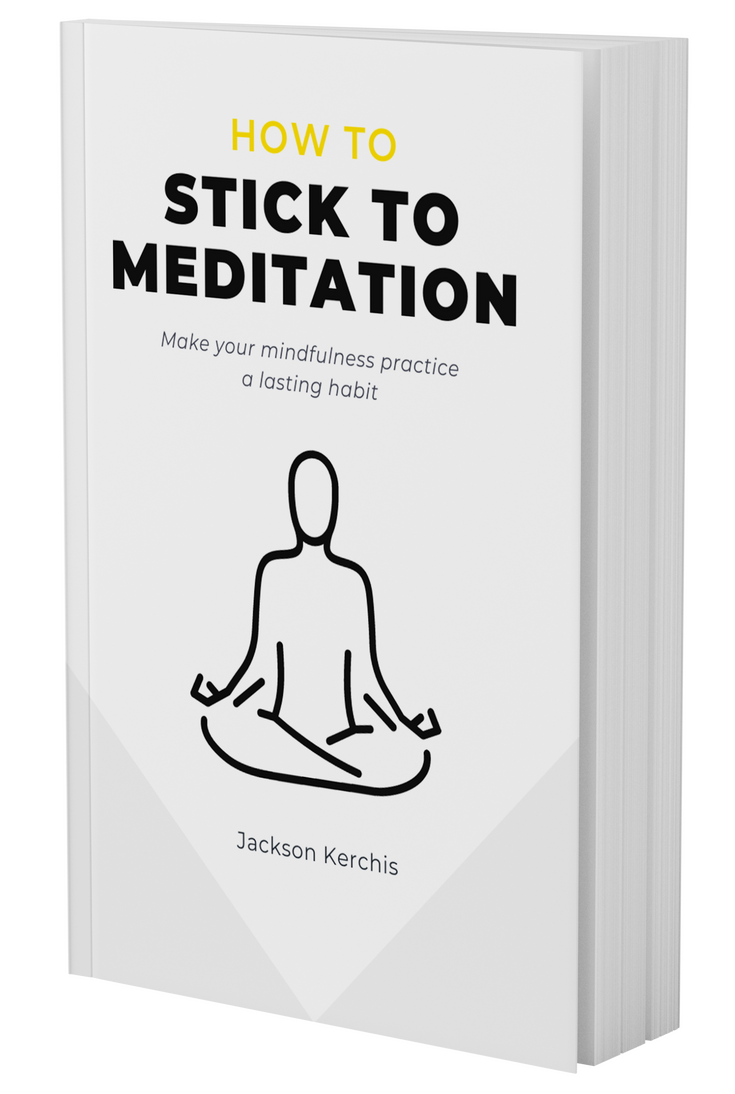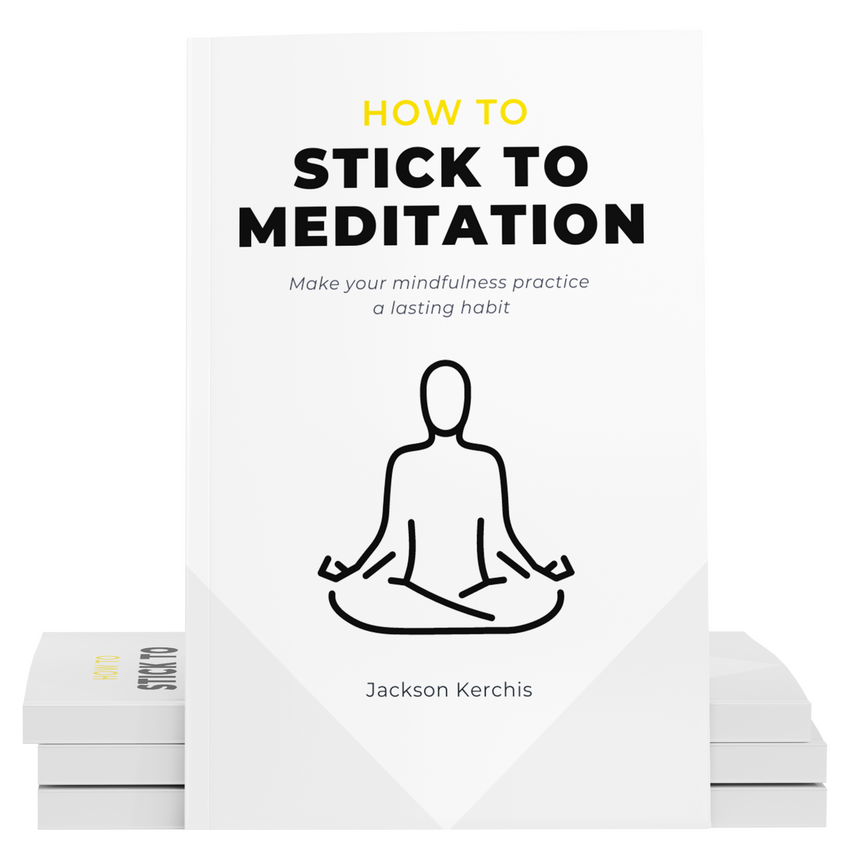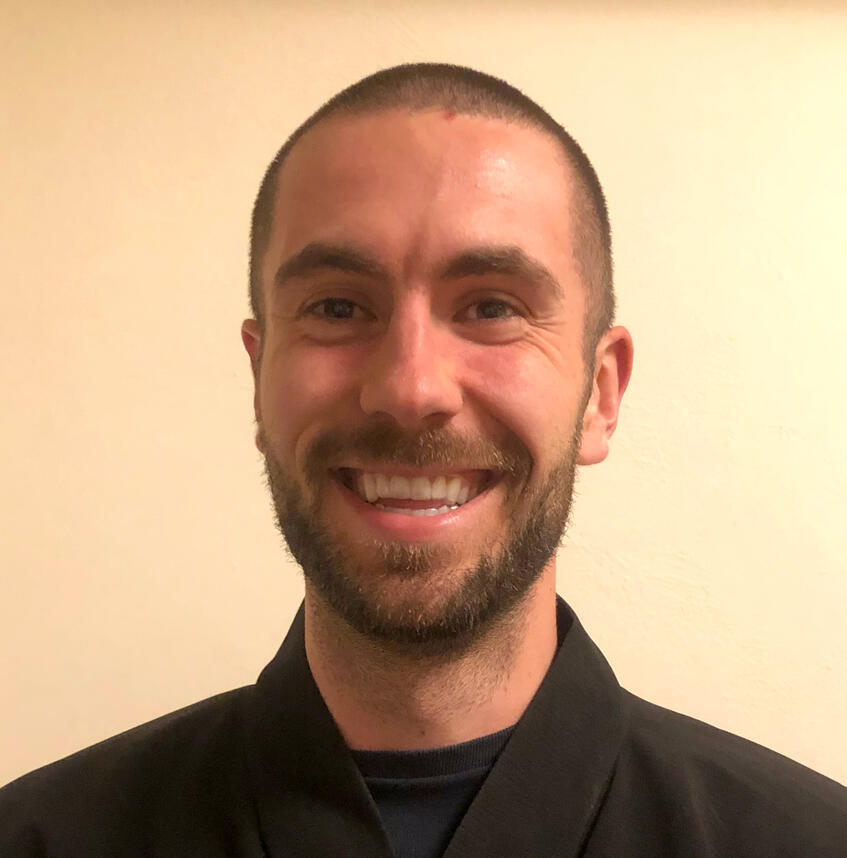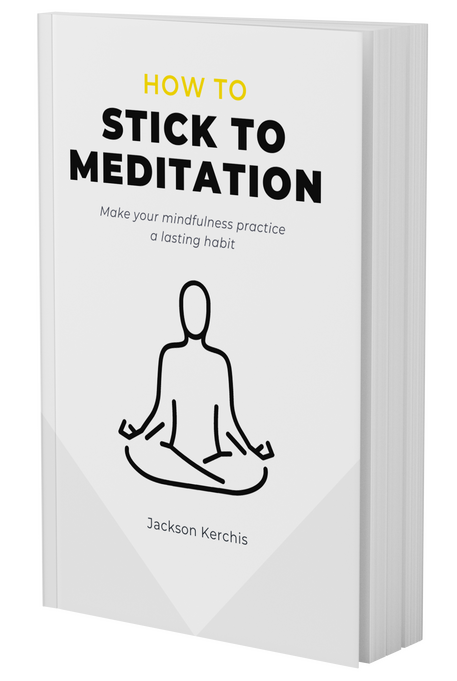Book | eBook | Audio

A practical guide from Jackson Kerchis
How to Stick to Meditation
The Science of Habit Meets The Art of Mindfulness

Ever tried to get into meditation
but couldn’t stick to it?
Have you heard about all the benefits of mindfulness but haven’t been consistent with it?
Do you feel like you just can’t meditate because you can’t stop yourself from thinking?
Are these creeping you out because it feels like I’m reading your mind?Okay – I’ll knock it off! My point is I know to ask these questions because you’re not alone.
That’s what inspired me to write this book!
When people find out I studied happiness, lived as a Zen monk, teach meditation, and have logged 2,000+ hours of meditation practice that’s usually what they tell me:
I’ve wanted to start meditating but I just can’t get into it.
I can’t stop my mind from spinning.
I was doing it for a couple weeks but then I fell off.
So I decided to write a short and practical book on how to stick to meditation.
Meditation + Psychology of Habit Formation
This book combines my time as a meditator and Zen monk with my background in positive psychology research and habit-based behavior change.
You will learn why meditation and mindfulness are essential to happiness and mental health.
Then you’ll learn how to use what I call “habit engineering” to design a meditation practice that you stick to for the rest of your life.
Get your copy here or keep reading to learn more.
Reviews
I met Jackson while I was working in investment banking compliance on Wall Street. His coaching helped me build a meditation habit even in the intense and high stress corporate environment. I’m excited to see him publishing a book based on the help he gave me.
– Jordan, Capital Markets Analyst
I feel like my mind is always running. So I didn’t think I could meditate. I would get into it then fall off. But now I’ve been going for 3 months strong.
– Andrew, Management Consultant OW
I’ve tried to get into meditation like 3 times. And every time I’d start for a week or two then a month later I’d realize I hadn’t meditated in forever. I tried building a plan based on the guidance in this book and since then I’ve been sticking to it almost every day.
– Beth, Registered Nurse
What you will learn from this book?
Your life is the meditation. It’s not about calming your mind for 15 minutes. It’s about cultivating the capacity to fully experience your life.
Mindfulness practice is associated with improved focus, cognitive performance, immune function, emotional intelligence, and wellbeing.
The art of “intention-attention” – how to focus on the future (intention) without forgetting to enjoy your experience of the present (attention).
Meditation practice transforms your mind (and changes your physical brain).
How to engineer a meditation practice plan that you actually stick to.
Seven principles of behavioral psychology needed to build a lasting habit.
To manipulate your own psychology into sticking to your commitments.

Jackson was a wild kid –
he wasn’t on a great trajectory...
In high school he broke his hand punching a wall, dislocated his shoulder fighting over an ex, and literally beat himself up when he didn’t do well in academics or sports. He was volatile, narcissistic, and insecure. And he was playing with fire in the forms of an eating disorder and abusing oxycodone.At 18 years old he wasn’t necessarily unhappy – but the future looked rocky.After senior year he moved to Europe. And he stumbled upon a TED talk by a famous monk named Matthieu Ricard. In this talk, he explained that happiness is not found in these instant gratifications and pleasures that leave us wanting more as soon as we get them. And it’s not found in pride or wealth which are very precarious and dependent upon factors outside our control.He said happiness is a product of mind training – intentionally cultivating positive states of mind and avoiding negative ones. And he had brain scans to prove it. He showed how the brains of monks who had spent thousands of hours in meditation practice were different from those of normal people.Jackson decided to try a free 8-week mindfulness program – he made a commitment to stick to it even if he felt like it was pointless.The days went by and not much happened. Truthfully, he struggled with meditation. He would sit for 2 minutes and realize he was planning his next meal, fantasizing future plans, or worrying about projects. But – credit to him – he just showed up every day.About 5 weeks in something strange happened – he was cooking dinner and knocked over a glass of wine. It shattered on the floor. He could feel the anger surge into his chest – he could feel the heat in his face. Remember this is the same kid who broke a hand punching a wall and dislocated a shoulder fighting!All of the sudden he started laughing. And he thought – why the hell am I laughing? Then he remembered that during the mindfulness course there was a lesson about how anger and humor often arise from the same seed. And if we can bring awareness to our initial reaction, we can choose how we respond.The next few weeks there were more of these mindful moments. And by the time he finished the course and returned home his friends could hardly recognize him. He didn’t party like a madman, he didn’t get into arguments, and he didn’t obsess over his insecurities and anxieties.Granted he was far from perfect. But he was fundamentally transformed.How did this happen?Just sitting, every day – weeks and months of his meditation habit wearing away at him. Just like putting some money away each month or spending some time with someone each week can compound into a big savings account or a strong relationship over months and years – mindfulness practice is the same way.20 minutes per day for 8 weeks becomes almost 20 hours. 30 minutes per day for a year becomes almost 200 hours. Much like falling in love – transformation happens slowly then all at once.Flash forward to today - and this Jackson kid is sitting here writing to you.Over the last 5 years I created a Happiness Studies major at the University of Alabama where I taught the first college class on happiness. I’ve won research grants for my work on habits and behavior change, been interviewed on podcasts, and consulted with Fortune 500 companies on how to develop mindfulness habits at work. (Read more about me below).I lived as a Zen monk and have over 2,000 hours of meditation practice.
And I wrote a book (this one!).
This book will teach you how to stick to meditation.
This works in 2 parts...
You’ll understand why meditation and mindfulness are important. I’ll share life lessons and stories like the one above as well as research from neuroscience and psychology.
You’ll learn how to implement a meditation practice plan that you’ll actually stick with. This works by understanding the principles of behavioral psychology and habit formation – and then using them on yourself!
By the end of this book you’ll be on your way to making meditation and mindfulness practice a habit.And over a few days and weeks, honestly, it won’t be a big deal.But in a few months or few years – I promise it will change your life. Just like it did mine.
About Me

My name is Jackson. My life’s work is the study of happiness.After finishing my economics major in 2 years, I struggled with the question of what should I do with my life? I thought – “what’s the one thing worth studying?”. And I realized – it’s happiness.I created the world’s first degree in happiness studies. Soon after I abandoned my path as a high octane management consultant and startup executive to focus on what I call life’s most important subject. I taught the first happiness course at the University of Alabama, won a lightbulb research grant for my work in positive psychology, and have been featured in magazines, podcasts, and media. In 2021 I lived and trained for 4 months as a Zen monk.I write, speak, and coach about mindful living and applied happiness research. I train and consult with organizations about putting happiness to work in business.Connect with me on socials @jacksonkerchis or through my website studyhappiness.blog.
Purchase Now
Get your copy of How to Stick to Meditation.
$18
Get Updates
Still not sure? Sign up for monthly emails to get a free 20 minute video and short guide.
© Untitled. All rights reserved.
